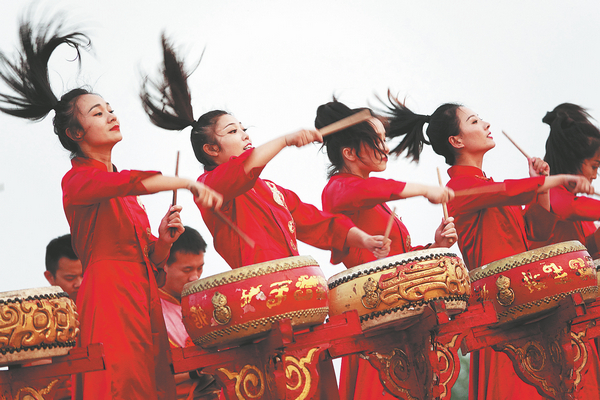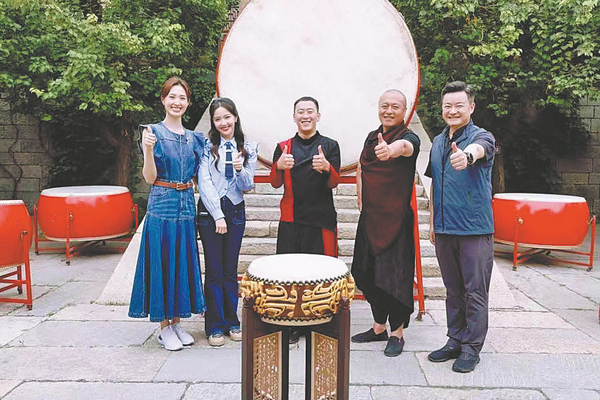Drums usher in a new beat
Updated: 2023-07-11

Established in Xinjiang county, Yuncheng, Shanxi province, in 1988, Jiangzhou Drum Troupe has been exploring ways to blend traditional drumming with contemporary stage performances. Dating back to before the Qin Dynasty (221-206 BC), drumbeats were employed as communicative signals in battle. [Photo provided to China Daily]
Troupe's mastery of ancient rhythm enchants audiences, report Wang Qian and Sun Ruisheng in Taiyuan.
With no narrative or stage set, musicians from Jiangzhou Drum Troupe use drumbeats and the sounds of Chinese cymbals to tell a heartwarming tale about a mouse who is seeking the strongest husband for his daughter.
Imitating the sneaky movement of mice with their bodies and facial language, the musicians have the audience in fits of laughter with their perfect combination of music and performance.
As night falls, the live show, Laoshu Quqin (Mice Wedding), at Xiyao village, Yuncheng, Shanxi province, has not only amazed villagers, but also netizens online. On short-video platform Douyin, the clip has garnered more than 1.3 million likes in total and brought the troupe and Jiangzhou drum music into the spotlight.
Dating back to before the Qin Dynasty (221-206 BC), drumming art originated in Shanxi's Xinjiang county, which was known as Jiangzhou.
Drumbeats were employed as communicative signals in battlefields, and nowadays they are an essential ingredient in most celebratory activities, even being inscribed onto the UNESCO Asia-Pacific Cultural Centre's List of Masterpieces of the Oral and Intangible Heritage of Humanity in 2002 and included in the National List of Intangible Cultural Heritage of China in 2006.
For Yang Dinghong, head of the Jiangzhou Drum Troupe, it is no surprise that the ancient drumming has the power to win audiences' hearts.
"Jiangzhou drum music can resonate with its audience, exploring the infinite rhythmic and tonal possibilities of the drum," Yang says, adding that social media provides a new platform for musicians to let more people appreciate its unique charm.
The charm, for Yang, is the thrilling moment when he first saw his father rehearsing Qinwang Dianbing (Prince Qin Takes His Roll Call) with other farmer musicians in 1987. "After that, I could not get the drumbeats out of my mind," he recalls.

Yang Dinghong (second from right), head of Jiangzhou Drum Troupe, appears on a TV show. [Photo provided to China Daily]
When the troupe, made of villagers, was established by Wang Qin'an in 1988, Yang quit junior middle school without hesitation and became one of its first batch of trainees. Although discovering his passion for drumming, Yang had a tough time making ends meet after his father passed away in 1989.
"In the early period of our troupe, there was no market for us. Wang had to pay from his pocket to run the troupe's operation. What kept us at it was the firm belief that our drum music would ultimately be seen," Yang says.
Despite taking the stage at the Great Hall of the People in Beijing in 1988 and performing at the 2012 China Central Television Spring Festival Gala, the troupe struggled to survive for years amid lack of performance opportunities and financial support.
The pressure to support his family forced Yang to accept reality.
He left the troupe in 1997 and set up a small company providing performances at various events, such as weddings and funerals. Whenever the troupe needed him, he would give a hand.
"After I got familiar with the market, I knew what was wrong with our troupe. Wang wanted to build a high-end troupe, but he ignored one thing — you had to make profits to make a living," Yang says.
Invited by Wang, Yang went back to the troupe in 2014, bringing his commercial ideas. "No matter whether it is a funeral, a wedding or a ceremony, we take every opportunity to perform, as long as there is money to be made," Yang says.
With an expanding performance schedule in nearby counties in Shanxi, the troupe has a busy daily schedule.
Getting up at 4 am has been their routine for performances in the morning, and night performances can last until midnight.
"Our schedule proves that my idea was right. It has not only guaranteed a monthly income for our performers, but also helped drum music get more public attention," Yang says. In a peak month, a troupe member can earn about 7,000 yuan ($966) for their hard work.
At the same time, Yang insists that the troupe should be committed to the development of traditional drum music into contemporary stage performances. "Every drum represents a character in a different repertoire, and different shape and size of the drum can produce different tones."
The biggest drum in the troupe has a diameter of 3.33 meters, which can have base sound, according to Yang.
Besides the domestic stage, the troupe has performed, to popular and critical acclaim, in dozens of countries and regions, including Denmark, Morocco, the United States, the United Kingdom, Canada, Malaysia, Singapore and Japan. In 2017, it opened the 15th Hong Kong Drum Festival amid fanfare.
The late veteran Hong Kong music critic Chow Fan-fu said on the official website of the Hong Kong Chinese Orchestra that the Jiangzhou Drum Troupe is "a rare gem" in the world of percussion music. "Their performances are both inspiring and exhilarating, often eliciting standing ovations and waves of resounding applause among Western audiences. It is as if the pulsating drumbeats have utterly shattered all cultural barriers."
Building a reputation both at home and abroad, the troupe has seen more young members join, such as 23-year-old Wang Haojie.
As a member of the social media generation, Wang Haojie likes to record the drum performance and post them on Douyin and it is his clip of Laoshu Quqin that has gone viral online.
"The sudden fame is out of my expectation and it is a great sense of accomplishment to be liked by so many people," Wang Haojie says, adding that after the video, many young people contacted him showing interest in drumming.
Although it is not a well-paid job, Wang Haojie and his companions are proud to inherit the pair of sticks from senior drummers, like Yang, and let the drum music be known by more people.
Starting drumming at the age of 8, Wang Haojie still remembers the impression of robustness and awesome magnitude after seeing the Jiangzhou drum playing at a village temple fair during a Spring Festival celebration. In his eyes, he says, Jiangzhou drumming contributed a lot for the vibrant development of percussion music in the country.
Contact the writers at wangqian@chinadaily.com.cn



